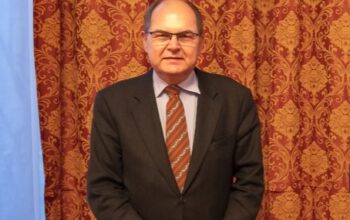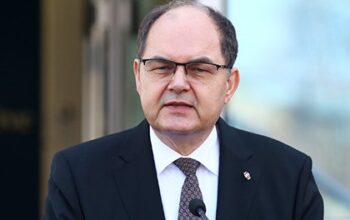In a recent joint press statement with the EU’s mission to BiH, the US Embassy announced that, following the no-confidence vote in the Federation’s House of Representatives, the US and EU had “no option but to discontinue our efforts to assist in restructuring the Federation government.” The tone of the press release was bitter and sullen, making it clear to Federation leaders that, despite the fact that “the responsibility for resolving the political stalemate lies with local leaders,” the internationals were not pleased. Nonetheless, the US Embassy confirmed that it would continue its larger efforts to “reform the Federation constitution.”
US Ambassador Patrick Moon announced his constitutional reform plan–or non-plan, as he would have it–on his blog in January: the embassy had assembled a group of local experts (an ex-president, a former constitutional court judge, a few scholars, and a civil society activist) who will help the embassy’s team learn the desires, hopes, and dreams of the Federation’s citizens and then–well, the ambassador isn’t clear on what happens then. Presumably, a set of constitutional amendments would be drafted, either by embassy staffers or by the expert panel, to be debated and voted on by the same Federation Parliament that can’t manage to successfully dissolve a government.
But that’s alright, because this process, Amb. Moon assures us, belongs to the people of the Federation and their elected representatives, not to the US. Of course, he also wrote in the same post that he and his experts would “not consider reforms that would further divide Bosnia.” So it would seem that this non-plan has some constraints.
What is the embassy’s justification (or mandate) for this reform effort? Amb. Moon tells us that constitutional reform is required because “the Federation is too complicated, too expensive and does not serve the best interests of the citizens.” But surely a man of his experience knows that these three things are true of virtually every state. They are not generally (or legally) accepted as grounds for foreign interference in the internal affairs of a sovereign state or its constituent entities. The Dayton Accords make no provision for such an initiative, nor did the Federation issue any invitation for such “assistance.” As a matter of fact, it’s not clear that reforming the Federation’s constitution is an explicit goal of the US government. The State Department’s leadership has made no mention of it, nor has the White House. A report provided to members of Congress by the Congressional Research Service at around the same time Amb. Moon wrote his blog post stated only that “press sources in the region claim that the United States has been working behind the scenes to promote talks among local leaders.” But the ambassador’s initiative explicitly excludes elected officials in favor of embassy-selected “experts”. Could there be more than one US initiative?
All states should be more efficient, more affordable, and more democratic, but these laudable goals provide no substantive direction for constitutional reform. That leaves the embassy’s experts in charge, presumably, so long as they adhere to the Ambassador’s undefined limitation of “not further dividing Bosnia.” If Amb. Moon wants the Federation to reform itself, surely he should not be setting up his own expert panels and fact-finding teams with their own guidelines and restrictions. What if Federation party leaders agree on a package of amendments that includes devolution of powers to the cantons? Will the US unilaterally derail them? What if the parties decide to dissolve the cantons while the ambassador’s experts find public support for the opposite? And if this project does reflect the priorities of the US and the international community, why is the EU not involved? With vague and conflicting goals and an unclear mandate, it’s likely this process will end either in US-funded deadlock or in another sulky press release.


